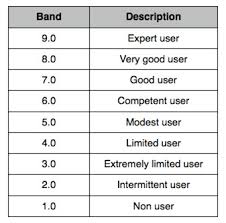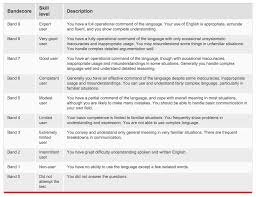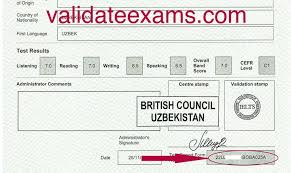Ielts Score Interpretation, The International English Language Testing System (IELTS) is a globally recognized English proficiency test that assesses the language abilities of non-native speakers. The test is widely used for academic, immigration, and professional purposes. A crucial aspect of the IELTS test is understanding how the scores are interpreted, which can vary depending on the purpose for which the test is taken.
IELTS Scoring System Overview
IELTS scores are reported on a band scale ranging from 1 to 9, with each band corresponding to a specific level of English proficiency. The overall band score is an average of the scores obtained in four sections: Listening, Reading, Writing, and Speaking. Each section is scored individually, and the average is rounded to the nearest half or whole band.
- Band 9 (Expert User): The test taker has full operational command of the language, with complete understanding and fluent expression.
- Band 8 (Very Good User): The test taker has complete operational command of the language, with only occasional unsystematic inaccuracies or inappropriate usage.
- Band 7 (Good User): The test taker has operational command of the language, though with occasional inaccuracies, inappropriate usage, or misunderstandings.
- Band 6 (Competent User): The test taker has an effective command of the language, despite some inaccuracies and misunderstandings.
- Band 5 (Modest User): The test taker has a partial command of the language, coping with overall meaning in most situations, though with many mistakes.
- Band 4 (Limited User): The test taker’s basic competence is limited to familiar situations.
- Band 3 (Extremely Limited User): The test taker conveys and understands only general meaning in very familiar situations.
- Band 2 (Intermittent User): The test taker has great difficulty understanding spoken and written English.
- Band 1 (Non-User): The test taker has no ability to use the language except a few isolated words.
- Band 0: The test taker did not attempt the test.
Interpreting IELTS Scores for Different Purposes
1. Academic Admission:
- Undergraduate Programs: Universities typically require an overall band score of 6.0 to 7.0 for undergraduate admission. Some competitive programs may require higher scores, particularly in specific sections like Writing or Speaking.
- Postgraduate Programs: For postgraduate studies, the required scores are generally higher, with many institutions asking for a band score of 6.5 to 7.5. Programs with a strong emphasis on communication, such as journalism or law, may demand even higher scores.
2. Immigration:
- General Immigration: For immigration purposes, different countries have varying score requirements. For instance, in Canada, the score required for the Federal Skilled Worker Program typically ranges from 6.0 to 7.0.
- Professional Registration: Certain professions, like medicine or law, may require a higher band score, often 7.0 or above in each section, to ensure that professionals can communicate effectively in their roles.
3. Professional Certification:
- Healthcare Professionals: Professions such as nursing or pharmacy may require an overall band score of 7.0 to 7.5, with specific scores in the Speaking and Writing sections.
- Business and Corporate Roles: For roles that involve extensive communication, companies might require candidates to have a band score of 6.5 or above.
Importance of Sectional Scores
While the overall band score is important, many institutions and organizations pay close attention to the sectional scores. For example, a university might require a minimum of 6.5 in Writing, even if the overall band score is 7.0. This is because different sections of the test assess different language skills, and a strong performance in one area cannot fully compensate for a weaker performance in another.
Conclusion
Understanding IELTS score interpretation is crucial for test takers to set realistic goals and prepare effectively for the test. Whether the test is being taken for academic, professional, or immigration purposes, knowing how scores are interpreted can help guide preparation strategies and ensure that the required scores are achieved.
When preparing for the IELTS, it’s essential to be aware of the specific score requirements for your goals and to focus on improving all four language skills to meet these expectations.



